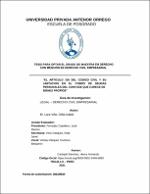El artículo 330 del Código Civil y su limitación en el cobro de deudas personales del cónyuge que carece de bienes propios

Ver/
Descargar
(application/pdf: 1.052Mb)
(application/pdf: 1.052Mb)
Fecha
2021Autor(es)
Lara Villa, Otilia Isabel
Metadatos
Mostrar el registro completo del ítemResumen
La investigación comprende la realidad advertida por la investigadora y se centra su objeto
de estudio y análisis en los alcances del artículo 330 del código civil, así como a su
limitación para el cobro de deudas personales del cónyuge que carece de bienes propios.
Durante el proceso de desarrollo y ejecución de la investigación, se recurrió al empleo de
métodos de investigación científica como el método científico, para ampliar y obtener
conocimiento; de otro lado también recurrimos a métodos generales o lógicos y a los
métodos específicos o jurídicos, los cuales conjuntamente con las técnicas e instrumentos
como el de recopilación documental y la entrevista a efectuada a especialistas directamente
relacionados con el tema en investigación, permitieron alcanzar los objetivos planteados;
en ese sentido nos planteamos como interrogante de investigación ¿En qué medida el
artículo 330 del Código Civil limita el cobro de deudas personales del cónyuge que carece
de bienes propios?
Al finalizar la investigación hemos podido llegar a establecer que “En la medida que se
requiere créditos impagos superiores a 50 UIT además del lugar donde debe solicitarse el
Proceso Concursal Ordinario, el artículo 330 del Código Civil limita el cobro de deudas
personales del cónyuge que carece de bienes propios”; del mismo modo se ha arribado a
conclusiones e incluso como aporte de la investigación se ha considerado la necesidad de
considerar la presentación de una propuestas legislativa como sugerencias para contribuir
a fin que el cónyuge deudor pueda pagar sus deudas sin afectar el patrimonio del otro
cónyuge su pretensión de corrección o reposición de sus derechos, cuando así resulte siendo
lo más justo. The present investigation developed the problems related to the application of the
guardianship of rights hearing in the Peruvian criminal process and the non-inclusion of the victim as a legitimate subject to urge the guardianship of rights hearing to be able to urge
them to safeguard their violated rights. legally recognized, the same that was analyzed from
the doctrinal perspectives, jurisprudential and specialists in the field, having as results the
violation of various criminal procedural principles as constitutional; for this the problem
was formulated: Is the Principle of Procedural Equality and the Right of Defense regulated
in the Criminal Procedure Code violated by not including the victim as a legitimated subject
to urge the guardianship of rights hearing?
In the development of this thesis, use was made of the scientific method, general or logical
methods, and specific or legal methods, together with the techniques and instruments,
mainly that of documentary compilation and that of interviewing various specialists in the
subject.
Results were obtained and the same were discussed, stating our position and adhering to the
position that the victim or aggrieved should be considered as a legitimate subject to appeal
via a guardianship when he considers that any of his legally recognized rights within the
criminal process have been violated. .
After the investigation we have reached conclusions and we have dared to propose
legislative suggestions in the hope that this will contribute to the establishment at the
legislative level of the procedural concept of legal protection so that the victim or aggrieved
party can instrumentalize before the Investigative Investigation Judge. claim of correction
or replacement of your rights violated.

